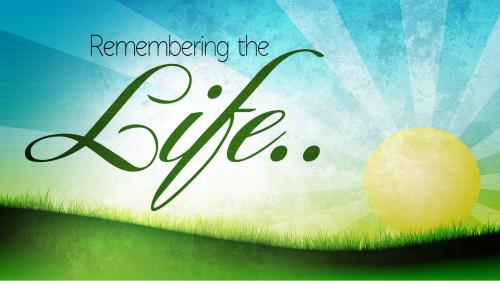-
O Grave Where Is Your Victory?
Contributed by Michael Grant on Nov 28, 2017 (message contributor)
Summary: This is a sermon I use for funerals
Death is something we tend to think very little about and yet if the Lord tarries we will all go by the way of the grave. Death carries for most people the fear of what happens next and there is only one source that reveals the truth about life after death and that source is the Bible, Gods word.
Hebrews 9:27 says “It is appointed unto man once to die and after this the judgment”. Death is something we all must face when our time comes but death need not be fearful for the one who has trusted in Jesus Christ as their Lord and Savior for He died for our sins according to the scriptures, he was buried and on the 3rd day He rose again according to the scriptures.
The Bible is clear on the subject of death and eternal life. In the 5th chapter of Johns gospel Jesus said “search the scriptures for in them you think you have eternal life and these are they which testify of me”
The scripture teaches it is wonderful to do good works but our good works can never earn us a place in heaven. Ephesians 2:8-9 says “For by grace are you saved through faith and that not of yourself it is the gift of God, not of works lest any man should boast”.
Everyone has to answer for themselves before God and it is not my place nor yours to judge. The Bible does say it is a fearful thing to fall into the hands of the living God and we should be prepared to meet God in this lifetime and not wait before it’s too late.
When it comes down to it, funerals in a sense are more for the living than they are for the departed. We are certainly here to pay our respects, to celebrate the wonderful memories but consider this - ____ is not sorrowful today – but we are. He is not in pain today, but many of you are. ____ is not fearful or anxious of what is to come but some here might be. How can we be assured that our brother ______________ is not experiencing those things? Because He was a child of God and the Lord has promised everlasting life - everlasting PEACE - AND EVERLASTING JOY to those who trust in Him by faith.
1 Corinthians 15:49-58 - And as we have borne the image of the man of dust, we shall also bear the image of the heavenly Man.
50 Now this I say, brethren, that flesh and blood cannot inherit the kingdom of God; nor does corruption inherit incorruption. 51 Behold, I tell you a mystery: We shall not all sleep, but we shall all be changed— 52 in a moment, in the twinkling of an eye, at the last trumpet. For the trumpet will sound, and the dead will be raised incorruptible, and we shall be changed. 53 For this corruptible must put on incorruption, and this mortal must put on immortality.
54 So when this corruptible has put on incorruption, and this mortal has put on immortality, then shall be brought to pass the saying that is written: “Death is swallowed up in victory.”
55 “O Death, where is your sting?
O grave, where is your victory?”
56 The sting of death is sin, and the strength of sin is the law. 57 But thanks be to God, who gives us the victory through our Lord Jesus Christ.
58 Therefore, my beloved brethren, be steadfast, immovable, always abounding in the work of the Lord, knowing that your labor (in the Lord) is not in vain.
In this passage the Apostle Paul makes the statement that “we have borne the image of the man of dust.” This speaks to our weakness, our frailty and our fallen condition. Without the grace of God, without our blessed hope what does man have? He has but a few short years upon this earth to eat, drink and enjoy the fruit of his labor.
The Bible speaks of Solomon, the third King of Israel as the wisest man who had ever lived, at least up until that point. Salomon had all that life had to offer, he had his health, he had power, he had fame and he had fortune and the conclusion that he drew was this – Vanity of vanities, all is vanity! He said there is nothing new under the sun, for under the sun is futility, emptiness, vanity.
Solomon was not describing life; he was describing life without God, he was describing a life without hope! And as we have borne the image of the man of dust, we shall also bear the image of the heavenly Man. When God created man He created him in His own image, according to His own likeness.

 Sermon Central
Sermon Central



